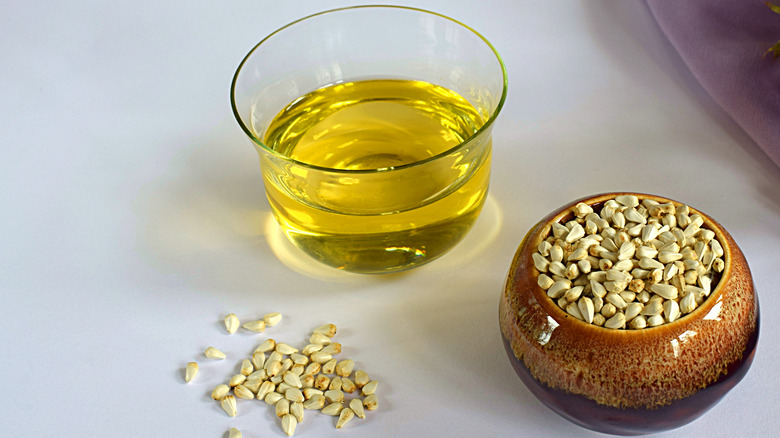Why You Should Be Using Safflower Oil In Your Skincare Routine
Nowadays, the skincare and beauty industry is saturated with a wealthy cache of products ranging from a variety of oils to creams and serums, but each does something different, so we're here to explain them. The oils you can now find include plum oil, carrot seed oil, and moringa oil, but they also include safflower oil. That's right — safflower oil is good for more than cooking!
In the kitchen, safflower oil is known for being a healthier option than, say, vegetable oil. It also has a high smoke point, meaning it can be heated to a high temperature without burning or becoming harmful to the body (via Healthline). Its best quality when consumed or used in the kitchen, though, is that it's a great source of unsaturated fatty acids, which Healthline noted are often referred to as "good fats." Of course, it doesn't have many vitamins or minerals, but it's worth substituting in for other oils. But how does it fare for your skin?
Safflower oil is full of acids that keep your skin young
When looking for safflower on product ingredient labels, you may have to look for its scientific name, carthamus tinctorius (via Herbal Dynamics Beauty). Any skincare product that says either safflower or this scientific name includes safflower oil, but what does it do for you?
When used as a skincare agent, safflower oil infuses your skin with vitamin E, which helps build your skin's protective barriers and which acts as a strong antioxidant (via Herbal Dynamics Beauty). This vitamin E concentration can help with age spots, skin irritation, and uneven skin texture. Moreover, safflower oil can reduce skin inflammation.
In addition to these benefits, safflower oil can help dry skin (via New Directions Aromatics). New Directions Aromatics noted that acne-prone skin and dry skin benefit the most from safflower oil's hydrating qualities. They also included that safflower oil has been used for skincare as far back as in Ancient Egypt, so if it's still being used after all this time, it must be doing something right! It seems to be its unique combination of acids that make it so powerful. According to New Directions Aromatics, safflower oil contains palmitoleic acid, linoleic acid, palmitic acid, and oleic acids, all of which bring their own qualities that help brighten and even out your skin.
If you haven't tried safflower oil on your skin yet, it's worth a shot!

